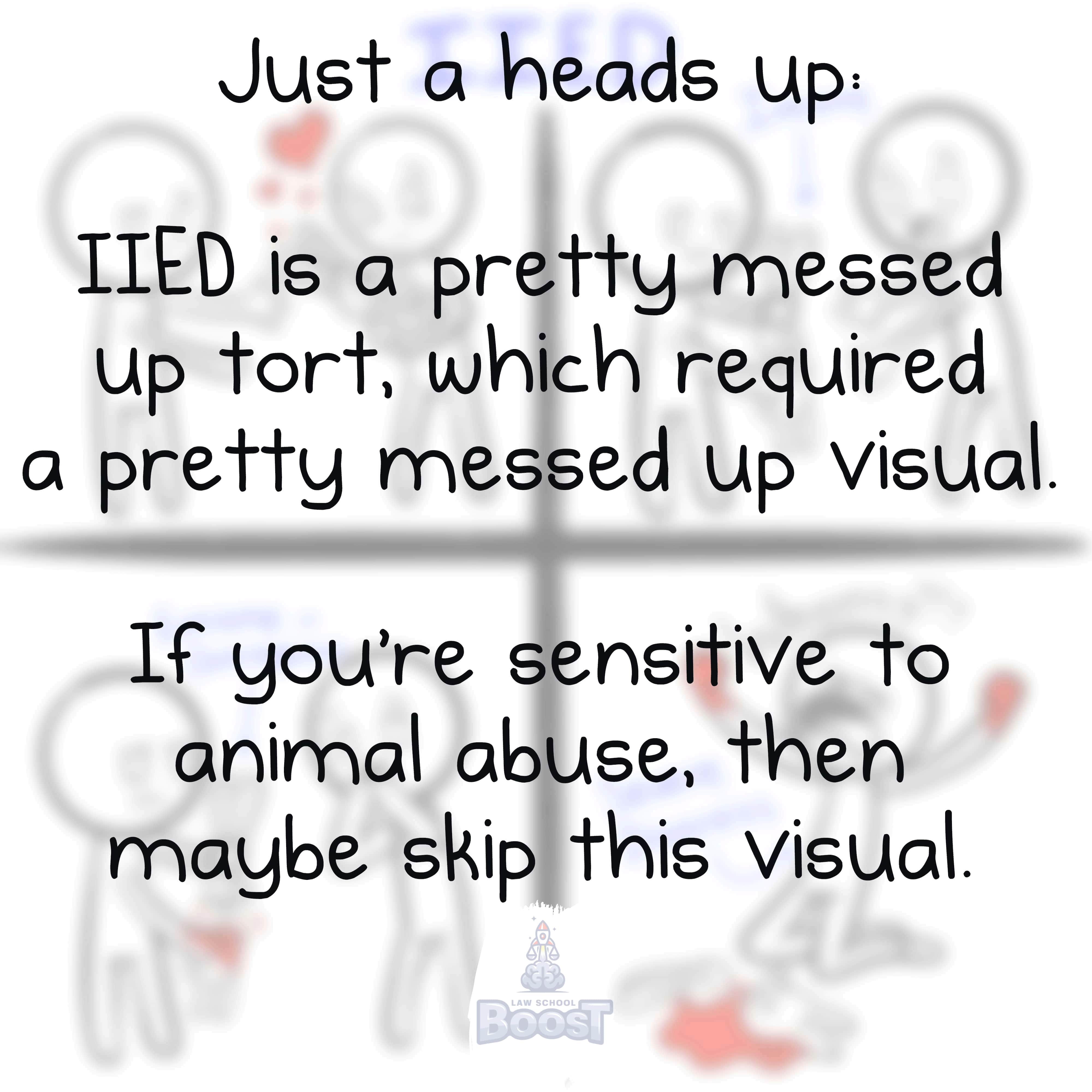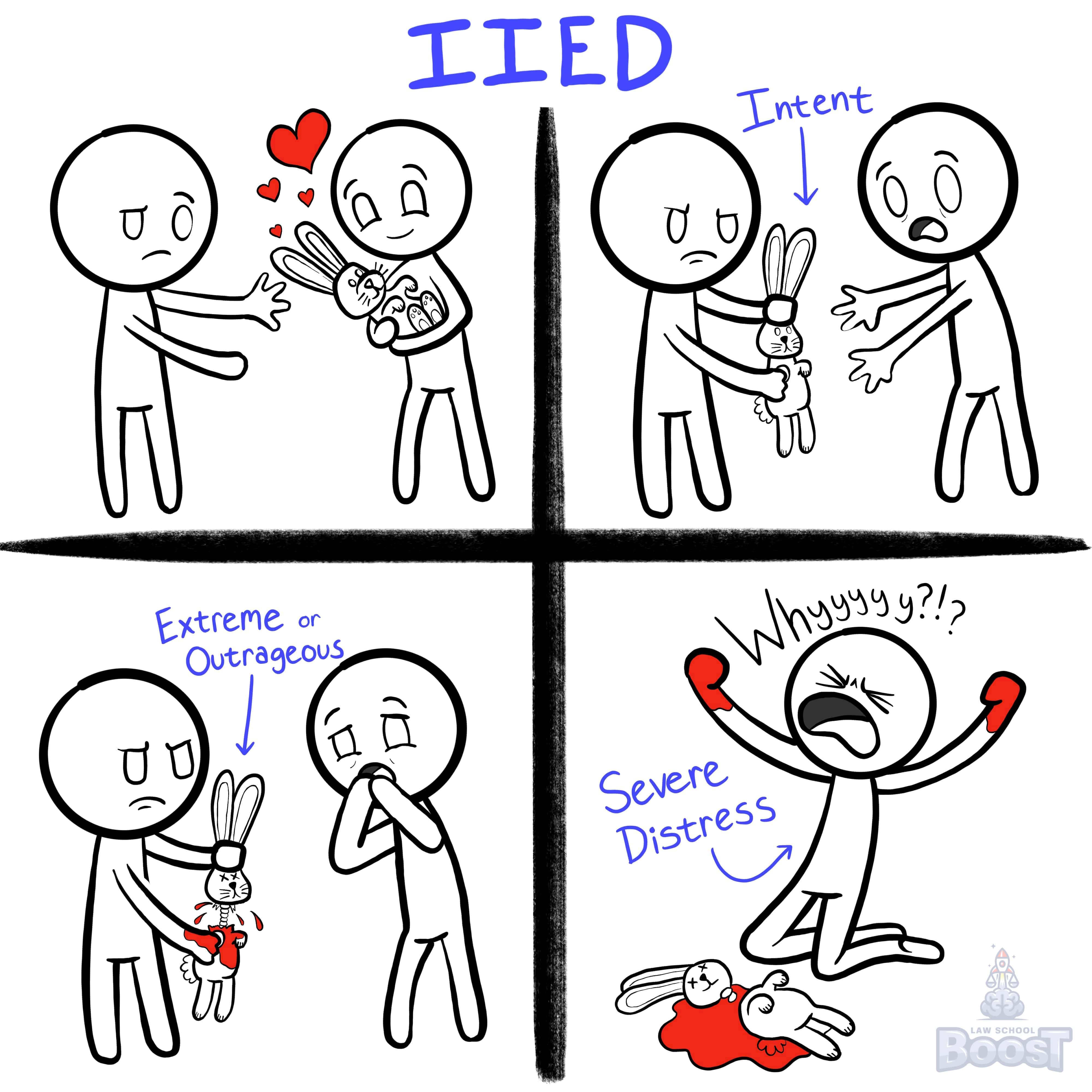👀
Torts • Intentional Torts
TORT#009
Legal Definition
IIED is (1) extreme and outrageous conduct that (2) intentionally or recklessly (3) causes (4) severe emotional distress. Nominal damages are insufficient for an IIED claim, which requires actual damages.
Plain English Explanation
Generally, the law cares about objective, identifiable harm, and "hurt feelings" are usually hard to identify. For this reason, the law generally doesn't care about feelings and emotions. The court prefers things like a broken windshield, a bloody nose, an exploding teddy bear... things that you can point at and go, "Yup, that actually happened." Additionally, freedom of speech and expression is generally something that is protected, even if it is offensive or inappropriate. However, there is a line, and when that line is crossed, IIED is the result.
In other words, IIED is a special tort reserved for special, unique circumstances where someone is so outrageously offensive or inappropriate that it understandable and reasonably causes emotional harm to the victim, like a mental breakdown, nervous shock, or extreme embarrassment/humiliation. When identifying IIED, you must equally examine both the action of the perpetrator and the result of the action on the victim. Overly sensitive victims will have no IIED claim simply because they experienced emotional distress as a result of someone being mean to them; likewise, it doesn't matter how horrifyingly barbaric a perpetrator may be if it doesn't actually affect the victim.
Note that the type of damages here will likely be in the form of medical bills, medication, therapy, etc.
In other words, IIED is a special tort reserved for special, unique circumstances where someone is so outrageously offensive or inappropriate that it understandable and reasonably causes emotional harm to the victim, like a mental breakdown, nervous shock, or extreme embarrassment/humiliation. When identifying IIED, you must equally examine both the action of the perpetrator and the result of the action on the victim. Overly sensitive victims will have no IIED claim simply because they experienced emotional distress as a result of someone being mean to them; likewise, it doesn't matter how horrifyingly barbaric a perpetrator may be if it doesn't actually affect the victim.
Note that the type of damages here will likely be in the form of medical bills, medication, therapy, etc.
Hypothetical
Hypo 1: Bob works at a hospital. One day, Sam's mother comes in for a check-up. As a practical joke, Bob calls Sam and tells him that his mother had gone into cardiac arrest, fell on the floor, and cracked her head open. Sam, hearing this, suffers a severe anxiety attack. Result: Sam has a claim against Bob for IIED, because Bob's conduct was so outrageous and it resulted in Sam suffering severe emotional distress. Moreover, if, as a result of Sam's anxiety attack, he develops a new illness, Bob will be liable for that illness.
Hypo 2: Bob sees Sam outside with his beloved pet hamster, Pebbles, who is playfully running around on Sam's lawn in a hamster ball. Bob walks over to Pebbles, makes eye contact with Sam, smiles, and kicks the hamster ball as hard as he can. Pebbles flies 5 yards before landing in the back of a woodchipper, grinding Pebbles up and spraying his remains onto Sam's face. Sam wipes off his face, looks at Bob, and says, "Dude, I can't believe you've done that again. Not cool. I'm a little upset at you." Result: Despite the extreme, outrageous conduct from Bob, because Sam is relatively fine with what happened, he has no claim of IIED.
Hypo 3: Bob calls Sam one day to let him know how he feels about Sam. Bob calls Sam multiple racial slurs, laced with profanities, and says that if he were there right now he would slit Sam's throat. Bob hangs up. Sam is shaken. He goes home early feeling ill from how Bob spoke to him. He can't sleep. He becomes sick. Result: Is Bob a huge jerk? Yes. Was his conduct arguably pretty outrageous and uncivil? Yup. But did Bob commit IIED against Sam? Not likely. It's not to say the law supports or encourages people to act like Bob. Rather, it goes to show just how extreme conduct must be in order to trigger IIED. Words alone, even if they are super hateful, are rarely enough.
Hypo 4: Bob calls Sam one day to let him know how he feels about Sam. He says exactly what he said in Hypo 3. The next day, Bob calls Sam again, saying even more extreme, hateful things. Moreover, Bob mails multiple letters to Sam with more hateful things. While Sam tries to sleep, Bob stands outside his window, yelling things into his room. By the end of the week, Bob has sent 100 nasty letters, 200 text messages, and 500 e-mails describing all the ways Bob wishes to dismember Sam's body. Sam, upon receiving another letter, snaps and has a mental breakdown. Result: Bob has committed an IIED. Unlike in Hypo 4, this wasn't a single call. It wasn't even a couple of calls. It was an insane, extreme amount of hateful speech that is so incredibly unlike a normal person that the law can punish Bob.
Hypo 2: Bob sees Sam outside with his beloved pet hamster, Pebbles, who is playfully running around on Sam's lawn in a hamster ball. Bob walks over to Pebbles, makes eye contact with Sam, smiles, and kicks the hamster ball as hard as he can. Pebbles flies 5 yards before landing in the back of a woodchipper, grinding Pebbles up and spraying his remains onto Sam's face. Sam wipes off his face, looks at Bob, and says, "Dude, I can't believe you've done that again. Not cool. I'm a little upset at you." Result: Despite the extreme, outrageous conduct from Bob, because Sam is relatively fine with what happened, he has no claim of IIED.
Hypo 3: Bob calls Sam one day to let him know how he feels about Sam. Bob calls Sam multiple racial slurs, laced with profanities, and says that if he were there right now he would slit Sam's throat. Bob hangs up. Sam is shaken. He goes home early feeling ill from how Bob spoke to him. He can't sleep. He becomes sick. Result: Is Bob a huge jerk? Yes. Was his conduct arguably pretty outrageous and uncivil? Yup. But did Bob commit IIED against Sam? Not likely. It's not to say the law supports or encourages people to act like Bob. Rather, it goes to show just how extreme conduct must be in order to trigger IIED. Words alone, even if they are super hateful, are rarely enough.
Hypo 4: Bob calls Sam one day to let him know how he feels about Sam. He says exactly what he said in Hypo 3. The next day, Bob calls Sam again, saying even more extreme, hateful things. Moreover, Bob mails multiple letters to Sam with more hateful things. While Sam tries to sleep, Bob stands outside his window, yelling things into his room. By the end of the week, Bob has sent 100 nasty letters, 200 text messages, and 500 e-mails describing all the ways Bob wishes to dismember Sam's body. Sam, upon receiving another letter, snaps and has a mental breakdown. Result: Bob has committed an IIED. Unlike in Hypo 4, this wasn't a single call. It wasn't even a couple of calls. It was an insane, extreme amount of hateful speech that is so incredibly unlike a normal person that the law can punish Bob.
Visual Aids




